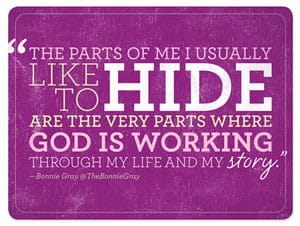Originally published Tuesday, 27 November 2012.
"The parts of me I usually like to hide are the very parts where God is working through my life and my story."
That's what I said earlier this year, when I was asked to look into a camera for DaySpring and answer how community has hurt me and how it's healed me. I took a deep breath and started talking about how I'd been afraid to open up about bad things that happened to me out in the mission field when I was in my twenties.
I was afraid because when I returned to confide in people -- people who were used to the bubbly Bonnie didn't know what to do with the broken Bonnie -- the Bonnie who was hurt and confused.
Silence only meant one thing to me. Rejection. I resolved to let time do its healing work. So, I went into hiding. For nearly a decade.
Parts of Me
I returned to doing the normal things I'd always done -- routine and predictability. I started getting busy again, exploring next steps, to prove to myself that I had moved on.
Slowly, it seemed everyone seemed comfortable with me again. No awkwardness, no hard questions. Just smiles set out like a welcome sign to tell everyone, "Hey, I'm back."
But, inside, not all of me was back. Parts of me had gone into hiding -- the ones most in need of community. Inside, I struggled with fears, insecurities and disappointment. I felt tired and alone.
God eventually led me to a new community of believers who loved me as an everyday person. Because I felt accepted and valued for my everyday struggles, I began feeling hopeful. As people shared their everyday struggles with me, I began to feel safe.
Maybe they'll love me for my broken parts too? I wondered.
Many years of isolating myself in pain, brought me to a place where I no longer wanted to suffer alone. I'd rather risk hurting, than living more years feeling trapped by hurtful memories. I encouraged the friends who were watching the video that it's worth coming out of hiding.
Because for all the people who had hurt me, God brought a new set of friends who met me on my journey -- to bring healing to my soul.
I Would Not Allow Myself
Little did I know while filming that video clip -- I would personally face the challenge to stop hiding and open myself into community in a big way again. Less than one year later.
Hide. That was my default reaction to experiencing panic attacks for the first time in my life. But, after a month of continuous panic attacks and growing anxiety, I knew -- without a shadow of a doubt -- that I would not allow myself to hide for another ten years. I
told myself, even if I were to get rejected again -- utterly rejected -- I'd have to fall back on my training. My faith community training.
Do not hide.
Whatever you do, Bonnie.
Do not hide.
I wasn't going to lose ten more years of being alone. I knew community healed me before -- and I knew community would be key to my healing again. I don't say this lightly, because there is great risk in being hurt.
But, then I think: Jesus Himself needed community. Jesus confided in three confidantes (Peter, James, and John) as He broke down in His darkest night in Gethsemane. The need to relate is part of our humanity and spirituality.
8 Ways
I'm still learning this come-out-of-hiding journey, but I'd like to share 8 ways I encouraged myself to come out of hiding and open myself up to community. I hope it gives you comfort knowing you are not alone and encourage you to know you can do it, too.
1. Don't wait until you're all better before you reach out to find a friend.
Reach out now, while you're broken -- and find the people who can truly be your friend. Now is the time to get the support you need. In some cases, I asked for specific help or advice. For others, I just wanted the support. This is the jist of what I've said, "I'm going through a hard time right now. I'd like to confide in you about it, so I'm not alone in it. It's not something I need solved. But, to make this journey, I need to know someone knows and someone cares. " This helps communicate to the other person I needed the safety rather than advice or problem solving (unless that is what you need). Because when you are overwhelmed, it's important to have the safety to feel and talk things through.
2. Assume there will be "sunk costs" in this investment in community.
I'm just keeping it real friends. There are people who have not walked this journey of transparency. Difficult emotions make them feel uncomfortable with their own anxieties and it can stress them out. So, don't take it personally if you try to make a connection and the conversation doesn't work out. Understand this person isn't the right match for this season of your journey. Early on, I had confided to someone who said my anxieties were caused by my failure to trust God -- which then plummeted me into a tailspin of discouragement. But, I kept reaching out until I found someone who could encourage me. It turns out I found great comfort in a friend I'd known for a decade, who I never knew she experienced panic attacks -- until after I confided in her.
3. View opening up as an act of trust in God rather than a test of someone's acceptance of you.
Finding a friend is another way of trusting God in the journey. You're going to need someone to walk this path with you. When Jesus sent out the disciples out in ministry, He sent them two by two. The new commandment Jesus gives us is to, "Love one another, as I have loved you." This love commandment is reciprocal, too. Jesus wants you to receive love and He will send someone to love you on His behalf. Seek and we shall find.
4. Create a list of people to confide in. Start with the most compassionate person you know and slowly challenge yourself to move down your list -- as you progress further along your journey -- adjusting how much you share with your comfort level.
Many of you belong to a lot of wonderful support communities (like Celebrate Recovery, AA, ...), so please share them with us in the comments. For me, here is the list I moved down. Your list will vary, so custom-fit per your need and circumstance:
1. My best friend. My husband.
2. The most compassionate person who has known me the longest.
3. The most compassionate person who I confided in during the last crisis.
4. The pastor who mentored me.
5. The pastor who married me and Eric.
6. The pastor of my new church. (I was definitely stepping out on a limb at this point (how would he view me?). But, our conversation helped confirm that authenticity was valued in this faith community.)
7. A few closest girlfriends.
8. A Christian counselor/therapist (This was the first time I tried this. It's hard to find the right one! Another post for another day...)
9. A few colleagues.
10. A new friend I met at my new church.
5. Say no -- and share honestly why you can't.
This one is hard for me, especially if I feel like I should do something or be somewhere. I feel if I don't say yes, I've let other people down or I feel guilty because I've failed in some way. One way of being open in community is honestly letting others into our world: our needs, our limitations -- as well as our passion, what we value and what our current priorities are, even if they differ from others.
6. Say yes -- and share honestly where you're at.
There are times God plops a wonderful opportunity in our laps -- to invite us to try something new, something we really want to attempt -- but are lacking confidence to commit. Give yourself permission to say yes -- and share honestly the questions or hesitations you have. You will be able to find others who identify with you -- gain a friend and encourage each other through these conversations.
7. Ask others about their stories. Really listen and be present.
This is a beautiful part of community that never fails to melt my heart when I'm frozen in isolation. When we take interest in others' stories, we give them permission to invite us to the tender places. We offer others acceptance -- and we receive the gift of transparency. We gain courage to be present with others and open up about our own journey in return.
8. Choose to believe God is at work in your story. He's living in you to come alongside others to live theirs.
Last, but not least, coming out of hiding is really a question of faith. If Jesus was working in me when life was good, was He still at work in me when life feels bad? Opening up to others when we are in the middle of our stories invites others to join us on the journey. Because the truth is, there will always be parts of us God is loving us back to life. We are all living stories being written. We can help encourage each other while the ink is still drying. We don't have to reject ourselves or each other. We can step out in the open and speak fully. We can embrace the beautiful real stories we are living, instead of hiding behind the lonely stories we wish we were living.
"Our lives are at constant risk for Jesus’ sake, which makes Jesus’ life all the more evident in us.
While we’re going through the worst, you’re getting in on the best!" 2 Cor. 4:7-12 (The Message)
~~~~~
What are ways you stop hiding and open up in community?
What holds you back?
Pull up a chair. Click to share a comment.
Let's do a little community right here. Add to your words of wisdom to the list.
~~~~~
Join Bonnie on her blog at http://www.FaithBarista.com, on Facebook or Twitter.
Bonnie Gray is an inspiring Christian writer and blogger, offering encouragement to keep faith fresh in the daily grind. Her writing springs from the belief that the beauty of faith often takes place when life goes off script. Bonnie is the Founder of FaithBarista.com and featured writer for Hallmark subsidiary DaySpring's (in)Courage. Bonnie is currently working on her debut book, to be published by Revell Books. Bonnie is a native Californian living in the heart of Silicon Valley with her best friend Hubby, wrangling their two heaven-sent boys on the homestead.
** Don't miss! ** If you would like to receive new articles by Faith Barista, click to subscribe by email and get each post in this series served up hot and fresh directly in your mailbox. Free.









